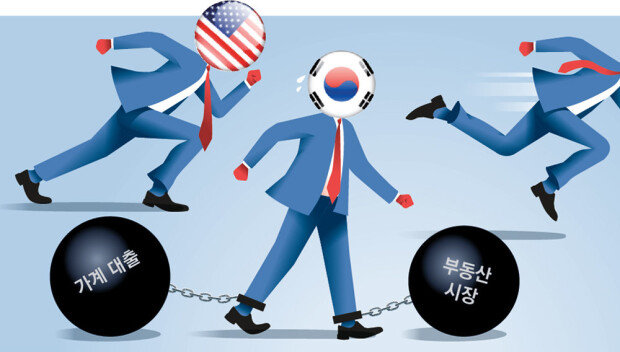BOK’s benchmark rate stuck by household debt
BOK’s benchmark rate stuck by household debt
Posted August. 23, 2024 07:47,
Updated August. 23, 2024 07:47

The Bank of Korea (BOK) held its key interest rate steady at 3.50% on Thursday, marking the longest period of unchanged rates in the country’s history. Since halting rate hikes in February last year, the central bank has kept the rate unchanged for 13 consecutive meetings, or approximately 19 months. While major economies such as the U.S. and Europe have either already cut rates or signaled plans to do so, South Korea remains constrained by its growing household debt, forcing it to maintain a high-interest-rate policy.
At a press conference following Thursday's Monetary Policy Board meeting, BOK Governor Lee Chang-yong stated, “Given the inflation level, conditions are leaning toward a rate cut.” However, he emphasized that “we must avoid the mistake of hastily lowering rates or excessively supplying liquidity, which could fuel a rise in real estate prices.” Despite the slowing economy and declining inflation, the central bank has opted to keep the current rate due to financial instability concerns, particularly in the housing market and household debt. The BOK also revised its real economic growth forecast for this year, lowering it from the previous estimate of 2.5% to 2.4%.
The BOK’s decision to maintain its rate contrasts sharply with other nations, which have started to cut rates. Canada was the first major economy to reduce rates twice since June, and the European Central Bank (ECB), which cut rates once in June, is considering further cuts in September. China also lowered its benchmark lending rate, the Loan Prime Rate (LPR), last month, and the U.K. enacted its first rate cut in four years earlier this month. In the U.S., a rate cut is widely expected next month. According to the minutes of the July Federal Open Market Committee (FOMC) meeting released on Wednesday (local time), a majority of the 19 participants indicated that a rate cut in September would be appropriate. Some on Wall Street are even predicting a substantial 0.5 percentage point cut by the Fed.
However, some experts argue that the government’s failure to manage household debt and real estate prices has left the BOK with little room to maneuver. Others warn that a premature rate cut could exacerbate the already overheated housing market and rising household debt. As of the end of June, household debt in South Korea had surged to a record 1,896 trillion won. Meanwhile, real estate prices, particularly in the Seoul metropolitan area, have been rising for 22 consecutive weeks.
조응형 기자 yesbro@donga.com
Headline News
- Harris ‘first female president’ vs. Trump ‘again 2016’
- N. Korea builds 11-meter rampart after road demolition
- Democratic Party eventually agrees to abolish financial investment income tax
- Drug smuggling is seized twice a day on average this year
- Surrounded by ‘uniforms,’ NHL’s first female coach ‘time-out’






